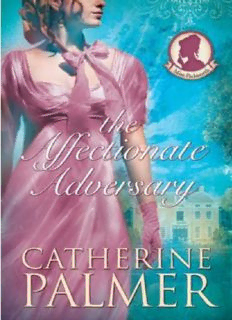Table Of ContentVisit Tyndale’s exciting Web site at www.tyndale.com
TYNDALE is a registered trademark of Tyndale House Publishers, Inc.
Tyndale’s quill logo is a trademark of Tyndale House Publishers, Inc.
The Affectionate Adversary
Copyright © 2006 by Catherine Palmer. All rights reserved.
Cover illustration copyright © 2005 by Cliff Nielsen. All rights reserved.
Designed by Rule 29 and Stephen Vosloo
Edited by Kathryn S. Olson
Scripture quotations are taken from the Holy Bible, King James Version.
Scripture quotations in the epigraph and Miss Pickworth’s Ponderings are taken from the Holy Bible, New
Living Translation, copyright © 1996, 2004. Used by permission of Tyndale House Publishers, Inc., Carol
Stream, Illinois 60188. All rights reserved.
This novel is a work of fiction. Names, characters, places, and incidents either are the product of the
author’s imagination or are used fictitiously. Any resemblance to actual events, locales, organizations, or
persons living or dead is entirely coincidental and beyond the intent of either the author or publisher.
Library of Congress Cataloging-in-Publication Data
Palmer, Catherine, date.
The affectionate adversary / Catherine Palmer.
p. cm.
ISBN-13: 978-0-8423-7549-8 (pbk.)
ISBN-10: 0-8423-7549-X (pbk.)
I. Title.
PS3566.A495A69 2005
813’.54—dc22 2005018812
Printed in the United States of America
11 10 09 08 07 06
9 8 7 6 5 4 3 2 1
To Becky Nesbitt and Anne Goldsmith,
who have guided and supported me for so many years. Thank you for
reacquainting me with Miss Elizabeth Bennet, Mr. Darcy, and the joys of Jane
Austen. If only you lived nearby, dear ladies, I might persuade you to follow my
example and take a turn about the room. It is so refreshing!
Looking at the man, Jesus felt genuine love for him. “There is still one thing
you haven’t done,” he told him. “Go and sell all your possessions and give the
money to the poor, and you will have treasure in heaven. Then come, follow me.”
At this the man’s face fell, and he went away very sad, for he had many
possessions. Jesus looked around and said to his disciples, “How hard it is for
the rich to enter the Kingdom of God!”
Mark 10:21-23
Contents
Title Page
Copyright Page
Acknowledgments
One
Two
Three
Four
Five
Six
Seven
Eight
Nine
Ten
Eleven
Twelve
Thirteen
Fourteen
Fifteen
Sixteen
Seventeen
Eighteen
Nineteen
Miss Pickworth’s Ponderings
Miss Pickworth Poses Problems
A Note from the Author
About the Author
The Bachelor’s Bargain
Acknowledgments
MANY THANKS to the people who encourage and support me as I write. I’m
grateful to my husband, Tim, for editing my books before I send them to Tyndale
House. Kathy Olson, my beloved Tyndale House editor, thank you so much for
the work you put into each manuscript. Anne Goldsmith and Becky Nesbitt,
bless you for acquiring my books and guiding me along the way. Ron Beers,
thank you for your vision and your faithfulness. Karen Solem, I’m grateful for
your advice and efforts as my agent. To everyone at Tyndale—marketing, sales,
editorial, warehouse—thank you for being a part of God’s work. Bookstore
owners, managers, salespeople, may God bless you richly for your service. And
to my Lord Jesus Christ, thank You for redeeming me. My life and my words
belong to You. Make of me what You will.
One
The Indian Ocean
April 1814
Through the salty mist that blurred the lens of his spyglass, Charles Locke
watched the pirate ship draw near. A large, stout vessel, it boasted thirty guns
and more than a hundred hands.
For two days, the captain of the privately owned clipper on which Charles
sailed had taken pains to elude the pursuers, tacking first to the south and then
heading due west toward the mainland of the African continent. His efforts were
to no avail. The pirates bore down on the Tintagel, hounding their prey on the
waters of the Indian Ocean—their familiar hunting ground.
“Have ye arms, Mr. Locke?” One of the ship’s boys joined Charles at the
rail. A ragged, scrawny lad of twelve, Danny Martin had attached himself to
Charles early in the voyage—polishing his boots, laundering his shirts, bringing
down a tray of tea in exchange for a few coins.
Charles enjoyed the young orphan’s company. From this child—who made
the Tintagel his home and the life of a sea captain his dream—he had learned
much about the ocean, her ships, and the world’s ports of call.
“We be in range of the pirates’ cannons now,” Danny declared, his gray eyes
earnest. “It cannot be long afore they attack. The cap’n bids me ask what means
of protection ye have, sir.”
“Nothing more than a pistol,” Charles told the boy.
“Captain Heald knows I am a merchant, not a soldier. Yet I am a fair shot
and I can handle a sword. Tell him I shall be happy to—”
“Take these.” Danny handed him a brace of pistols and a small dagger.
“They be from the cap’n’s own closet. He says ye must do your best with them,
sir, for he has no others to spare.”
“But our ship’s guns outnumber theirs, and the Tintagel is larger. Surely we
can defeat such untrained savages.”
The lad’s narrow face grew solemn as he studied the approaching vessel.
“The Tintagel be no warship, Mr. Locke. We have fewer hands on board, and
them chaps be pirates from the Malabar Coast of India—the most fearsome of
all. They ply the waters from their homeland southwest to Madagascar, north to
the Gulf of Aden, and back to India again. They’ve not had formal trainin’ at the
Royal Naval Academy, no, but they be masters at fightin’, sailin’, and sinnin’.
We’ll be thankin’ God if we come out of this alive.”
His anxiety increasing, Charles thought of the chest of gold coins secured
with locks and seals in the bowels of the Tintagel. Charles’s father had labored

